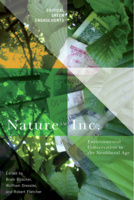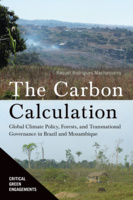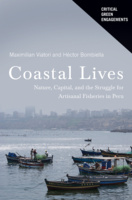Alterhumanism
Becoming Human on a Conservation Frontier
On the conservation frontier of southern Chile, the lives of smallholding settlers, Indigenous Mapuche farmers, environmental activists, entrepreneurs, and conservation scientists all grapple with the enduring impacts of settler-caused environmental depletion, aspirations for a new ethics of care, and the promises of an ecotourism boom. Here, the question of what it means to be human is not simply an existential concern but the reflexive result of experiences of becoming human through and with nonhuman others in an increasingly uncertain world.
Nature Inc.
Environmental Conservation in the Neoliberal Age
Cookstove Chronicles
Social Life of a Women’s Technology in India
Cookstove Chronicles examines India’s handcrafted, wood-burning cooking stoves, the rural women who use them, and outsiders who try to improve them by engineering a range of “clean” cooking devices. Khandelwal adopts a transnational feminist, anthropological, and STS perspective to reimagine the humble mud stove as both villain and hero of this story and to suggest pathways for collaboration across radical disciplinary divides.
We Stay the Same
Subsistence, Logging, and Enduring Hopes for Development in Papua New Guinea
Written in a clear and relatable style for students, We Stay the Same combines ethnographic and ecological research to show how the people of New Hanover, Papua New Guinea, continue to survive and make meaningful lives in a situation where their own hopes for economic development via logging and commercial agriculture have often been used against them as a mechanism of a more distantly profitable dispossession.
Hottest of the Hotspots
The Rise of Eco-precarious Conservation Labor in Madagascar
Continually recognized as one of the “hottest” of all the world’s biodiversity hotspots, the island of Madagascar has become ground zero for the most intensive market-based conservation interventions on Earth. This book details the rollout of market conservation programs, including the finding drugs from nature—or “bioprospecting”—biodiversity offsetting, and the selling of blue carbon credits from mangroves. It documents the tensions that exist at the local level and provides a voice for community workers many times left out of environmental policy discussions, ultimately in the hope of offering critiques that build better conservation interventions with perspectives of the locals.
The Carbon Calculation
Global Climate Policy, Forests, and Transnational Governance in Brazil and Mozambique
The Carbon Calculation critically highlights the ways in which politics has reinforced a scientific focus on one possible solution to the problem of climate change—namely those that largely absolve the industrialized world from undertaking politically painful transformations in its own economic model.
Voluntourism and Multispecies Collaboration
Life, Death, and Conservation in the Mesoamerican Barrier Reef
An ethnographic exploration of the world of conservation voluntourism and relations of care between humans and vulnerable species on the Honduran Bay Island of Utila.
Running After Paradise
Hope, Survival, and Activism in Brazil's Atlantic Forest
This book looks at social-environmental activism in one of the world’s most important and threatened tropical forests—Southern Bahia, Brazil. It explores what it means to be in and of a place through the lenses of history, environment, identity, class, and culture. It uncovers not only what separates people but also what brings them together as they struggle and strive to create their individual and collective paradise.
Corporate Nature
An Insider's Ethnography of Global Conservation
Drawing from personal experience, Sarah Milne looks inside the black box of mainstream conservation NGOs and finds that corporate behavior and technical thinking dominate global efforts to save nature, opening the door to unethical conduct and failure on the ground.
Narrating Nature
Wildlife Conservation and Maasai Ways of Knowing
Narrating Nature opens up dialogue that counters traditional conservation narratives. It offers conservation efforts that not only include people as beneficiaries but also demonstrate how they are essential and knowledgeable members of the conservation landscape itself.
Once Upon the Permafrost
Knowing Culture and Climate Change in Siberia
Once Upon the Permafrost is a longitudinal climate ethnography about “knowing” a specific culture and the ecosystem that culture physically and spiritually depends on in the twenty-first-century context of climate change. Through careful integration of contemporary narratives, on-site observations, and document analysis, Susan Alexandra Crate shows how local understandings of change and the vernacular knowledge systems they are founded on provide critical information for interdisciplinary collaboration and effective policy prescriptions.
Naturalizing Inequality
Water, Race, and Biopolitics in South Africa
The book discusses the reproduction and legitimization of racial inequality in post-apartheid South Africa. Michela Marcatelli unravels this inequality paradox through an ethnography of water in a rural region of the country. She documents how calls to save nature have only deepened and naturalized inequality.














